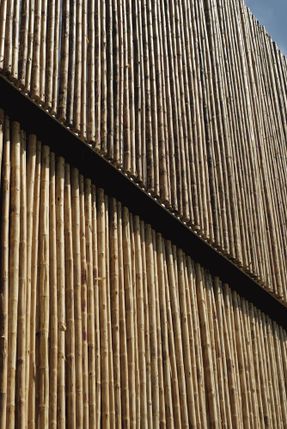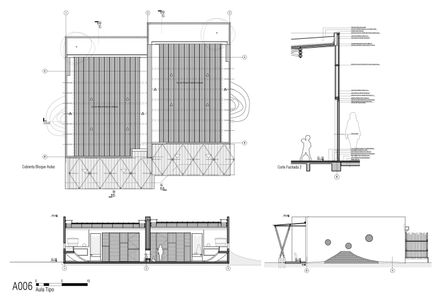El Guadual Children Center
El Guadual Children Center
Daniel Joseph Feldman Mowerman + Iván Dario Quiñones Sanchez
ARCHITECTS
Daniel Joseph Feldman Mowerman, Iván Dario Quiñones Sanchez
CONSTRUCTOR
Fundación Compartir
PRESIDENTIAL COUNSELOR
María Cristina Trujillo De Muñoz
CLIENT
Instituto Colombiano De Bienestar Familiar, Icbf
MANUFACTURERS
Acesco, Argos, Calypso, Corona, Fiberglass Colombia, Guadua Macana, Lfalum, Metalinox, Reforplas, Servimontajes Y Suministros
ARCHITECTURAL DESIGN
Plan Padrino, Alta Consejería Presidencial Para Programas Especiales, Presidencia De La República De Colombia
COLLABORATORS
Gabriel Cano, Andrés Ortega, Eugenio Ortiz, Sandra Pined
PHOTOGRAPHS
Ivan Dario Quiñones Sanchez
AREA
1823 m²
YEAR
2013
LOCATION
Villa Rica, Colombia
CATEGORY
Kindergarten
Text description provided by architect.
Composed of 10 classrooms, dining hall, indoor and outdoor recreation, semi-private arts spaces, first aid room, administration, vegetable garden, water feature, public outdoor theater, and a civic plaza, El Guadual Early Youth Development Center in Villa Rica.
The Center's inauguration in October 2013, marked the end of a three year long participatory design and construction effort that has strived to generate pride and ownership since the beginning of the process.
El Guadual has generated a notable urban impact for it offers generous sidewalks and landscape to the public, an open public outdoor movie theater.
The 10 classrooms designed following the Reggio Emilia pedagogic system offer open spaces, obstacles, and multiple variables to navigate the center making the process of discovering the center itself both a challenge and a game making education a recreational experience.
It is responsible with the environment inn terms of the materials it use, the water and energy it consumes, and the durability of the materials.
The textured walls were made using local techniques of split bamboo form work. The project is an example of low tech environmental construction.
Finally, El Guadual is slowly transforming a new city center where education, arts, and multi-generational gatherings are taking place making the care of the municipalities early youth a communal responsibility.
The use of bamboo as a way of re-valuing local traditions in a contemporary way speaks of the need to use local materials as well as preserve the riverbeds.
The wide array of public amenities has made of El Guadual a new pole of activity within Villa Rica.
Numerous entrances and exits connecting paired up classrooms through mountains, bridges, stairs, and slides foster an environment of decision taking and individual development through architecture.
The spaces all receive natural light throughout the days and are ventilated naturally allowing the center to work without the need of energy.
The funds to build the project came form international cooperation, private donations, public resources, and in kind donations.
Each classroom has its own bathroom allowing kids to use it whenever they feel like it, not when the teacher can take them allowing educators to focus on the pedagogical activities.
The textured concrete walls absorb heat keeping the spaces cool, and the multi-layered roof controls the impact of the sun inside the rooms.
Additional to the construction jobs, 30 local women were trained in early youth educator before being certified and hired to become the daily workforce of the center.
The construction lasted 9 months and the total cost of the project was US$1.6 Million.
Each classroom collects rain water that is used for gardening and maintenance, but makes the process of collection and utilization evident for the kids and visitors.
The central water feature recirculates the water it uses and allows kids to interact with water as a recreational element.
The fence capped with recycled bottles were collected and installed by the educators who now take care of the kids in the center.
Design charades with local kids, teenagers, early youth workers, and leaders were the starting point of the design in terms of spaces, materials, dimensions, and relations with the city.
Cauca provides food, education, and recreation services to 300 kids 0-5 years old, 100 pregnant mothers, and 200 newborns as part of the national integral early youth attention strategy "de Cero a Siempre".
During the construction process more than 60 local builders were employed and certified in construction techniques. A semi-private arts and performing room open to the community at night and weekends, and a civic square.









































